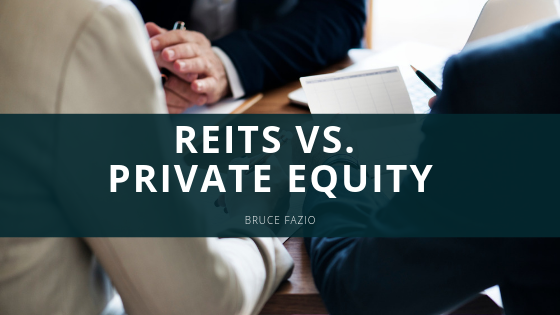We’ve previously discussed the importance of building property portfolios, as well as offering a few ways to expand yours. However, if new to real estate, certain opportunities for investment may seem implausible or out of your budget. Many investors turn to real estate investment trusts (REITs) or real estate private equity funds (RE PE) that allow them to invest in real estate without having to buy or manage properties.
Both types of investments increase portfolio diversity, earn income, and offer tax benefits. So what are the differences between these two investment opportunities and how can you determine which route is best for you?
Up-Front Fees
REITS: Due to sales commissions, management fees, and expenses within the organization offering the REIT, these investments typically decrease in value as soon as they are issued. Generally, upfront fees and commissions make up 15% of the offering price.
Private Equity: In most cases, private equity firms have a more attainable and approachable fee structure. This is due, in part, by their ability to invest in properties directly, slashing needs for a fee that would help pay the middleman.
Quality of Investment
REITs: Since private REITs require investor money upfront, before a property is even bought, these companies may not be investing in properties that can generate the best returns. This increases risk due to the fact that these companies need to pay dividends out at a steady pace. With the wrong property, they may be unable to keep up with them. At that point, REITs have to turn to other investors’ capital.
Private Equity: Unlike REITs, private equity firms only ask investors for funds when a property is found. Investors can then decide whether or not they deem the property suitable for investment and to give funds to the firm. Such an exchange minimizes risk for an investor as well as promises a higher return.
Tax Benefits
REITs: REITs are exempt from property taxes due to their high dividend distribution. Because of this, the investors and shareholders become responsible for paying these property taxes. In the case of a payout, REITs are taxed on the investor’s higher ordinary income rate.
Private Equity: Governed under a different set of regulations than REITs, private equity firms will typically offer more appealing tax benefits. Benefits include capital and depreciation. These benefits will give investors more steady and long term gains that add to their investment.
Investor Priority
REITs: Private REITs high fees are often used to pay those they acquire properties from or firms they work with. Since they prioritize paying these individuals first, REITs can often make deals just to generate fees, as the SEC warns. REIT managers are also able to pay themselves in stock which can decrease investor’s worth.
Private Equity: In most cases, private equity firms will only pay managers after their investors generate a return. At other firms, managers are compensated based on performance. Both avenues mean that the private equity firms are focused on providing investors with a healthy return.
In short, all real estate investment opportunities present risks, but they are not created equally. If you’re looking to maximize your property portfolio, you should choose the investment that will offer a quality share and prioritizes your investment by providing valuable tax benefits and profitable properties to invest in.


Recent Comments